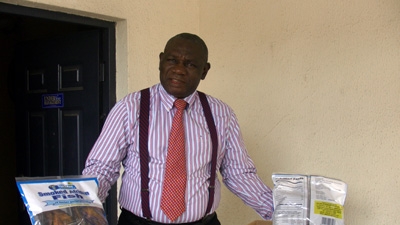LAGOS STATE, May 12, 2014 – After years of trying to sell agricultural products internationally, Nigeria’s fish farmers have finally broken into the international market.
Branded smoked fish produced by fish farmers in Lagos State is now selling in the United States. With the success of the smoked fish, branded cashew nuts produced in Enugu are also being evaluated for sale internationally.
The breakthrough comes in part from the success of the Commercial Agriculture Development Project (CADP), supported by the World Bank. Through CADP, farmers were introduced to new smoking kiln technology that improved fish processing by reducing the smoke level to internationally acceptable standards.
As a result of new techniques, Tunde Sanni, a member of Post-Harvest Commercial Fish Processor Commodity Interest Group (CIG) and owner of Tee Ess Farms in Lagos, was recently certified by the United States Food and Drug Administration (FDA) to produce smoked fish for the U.S.
“Before the CADP intervention, processors were producing 150 kilograms of locally smoked fish per week, using excess charcoal with all its negative health implications and entry barrier to the international market,” Sanni said. “After the technology intervention and participation in capacity-building activities facilitated by CADP, our smoking methods just got better.”
With CADP and working with experts and consultants from the United States, processors have created branded packaging for filleted and whole smoked fish. The packages have barcodes that enhance competitiveness and protection while establishing corporate identity in the market.
“My farm also smokes fish for other farmers according to international standards and they package the fish with their label,” Sanni said.
Presently, a pack of 500 grams of smoked catfish purchased from Nigeria at $12.50, sells for between $15 and $20 internationally making it a potentially profitable business.
“We are pleased to see that with appropriate support and incentives, Nigerian farmers can break through sophisticated markets such as the US market,” said Marie Francoise Marie-Nelly, World Bank Country Director for Nigeria. “This is very encouraging and going forward, we would like to see many more examples that will help make the Nigerian Government’s vision of transforming agriculture from subsistence level to a business venture a reality.”
The CADP program operates in five states: Cross River, Enugu, Kaduna, Kano and Lagos focusing on palm oil, cocoa, fruit trees, poultry, aquaculture, dairy and staples such as maize and rice. The smoking kiln technology has been adopted in Lagos State by 168 farmers – 71 males and 97 females – and more than 2,215 jobs were created as a result of the new technology.
Aderemi Giwa, a member of the Lagos Chamber of Commerce and Industry, is excited about this new development in agriculture, and described the inroad into the International and US markets as a major accomplishment for Nigeria the fish industry.
“This new smoking technology, with the support of World Bank through the Commercial
Agricultural Development Project, has really moved fish farming in Lagos State to a new and unparalleled dimension,” Giwa said. “Farmers can now export directly to the US market, thereby boosting our economy and at the same time increasing the standard of living of Nigerian fish farmers.”
The project is supported by the International Development Association (IDA), and aims to upgrade subsistence agriculture to commercial ventures focusing on small and medium scale commercial farmers and agro-processors.

